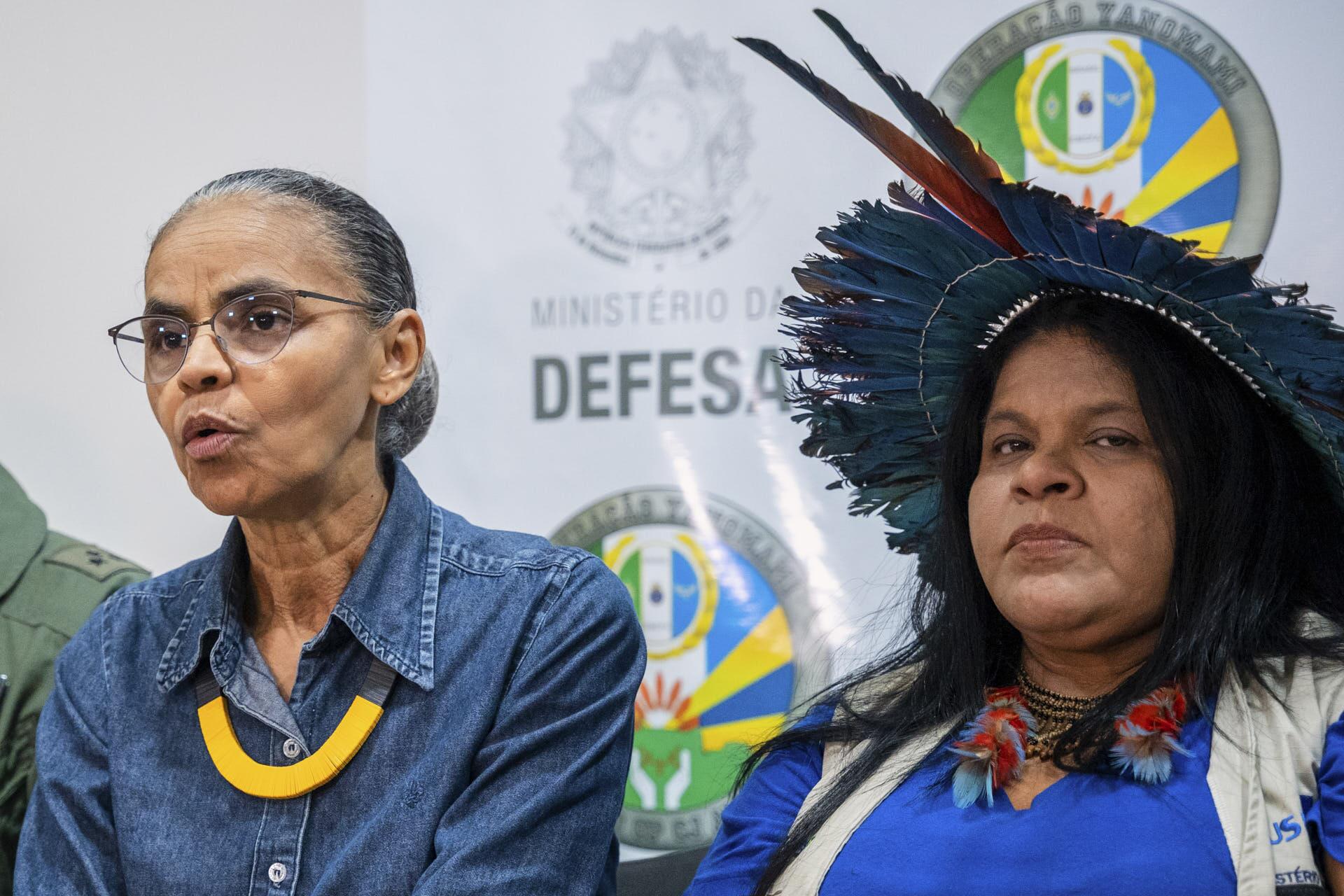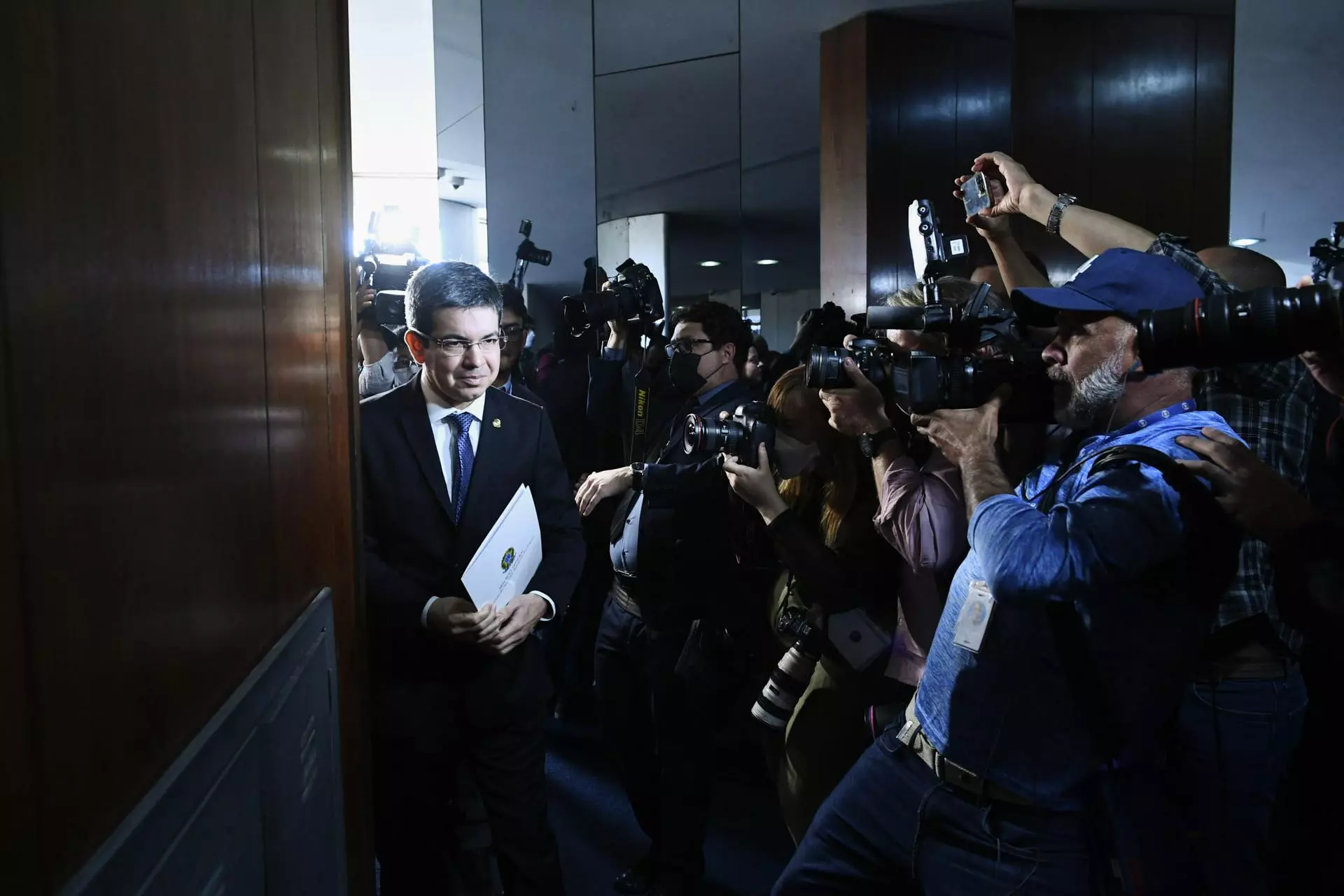The decision by Brazil’s environmental protection agency Ibama to deny the state-run oil company Petrobras a license to open a new exploratory front in the Amazon was a victory. Not a victory for Ibama president Rodrigo Agostinho, who signed the document on May 17. Not a victory for Marina Silva, minister of the Environment and Climate Change. Not a victory for the Indigenous peoples and traditional forest communities that would be affected if the exploration proposal were to go forward. Not a victory for the populations living in cities and regions that might be impacted in the case of an oil spill. No. It was a victory for the best science and the best politics. It was a victory for intelligence. It was a victory for life.
If this victory is reversed by the Congressional attack on Marina Silva and the Ministry of the Environment and Climate Change, in which vital areas were taken away from the ministry, it’s over. It’s not over for Marina or her ministry. It’s over for the Lula administration, which will turn into a replay of Jair Bolsonaro’s fascist government. “The Brazilian people elected President Lula, but it looks like Congress wants a replay of the Bolsonaro administration,” the minister said.

MINISTERS MARINA SILVA (ENVIRONMENT) AND SONIA GUAJAJARA (INDIGENOUS PEOPLES) RUN THE RISK OF HAVING THE MINISTRIES THEY HEAD UP DEPLETED AS A RESULT OF PRESSURE FROM CONGRESS, WHICH IS CURRENTLY DOMINATED BY A CONSERVATIVE, RURALIST POLITICAL ELITE. PHOTO: JULIA PRADO/MS
If the Congressional attack on our children’s future is successful, it’s over for everyone, because none of the Brazilian biomes known as the Amazon, Cerrado, Pantanal, Atlantic Rainforest, Caatinga, and Pampa will survive a second predatory government. And if these enclaves of nature do not survive, it will even be over for large agrobusiness interests, because without rain, there is no production, no exports, no profit. And this is no exaggeration. It is what the best science has shown. Understand this: we’ve reached the limit and it can’t be pushed further.
The decision on oil points to what is happening in other areas. As part of a special report by the journalist Claudia Antunes published in February, SUMAÚMA showed that, despite the recent change in government administrations, Petrobras was moving ahead with its proposal to drill for oil at the mouth of the Amazon. Since then, our journalism platform has registered every step of this crucial process for the environment. Among a number of stories, we published exclusively that Ibama’s technical division had turn down the application for the license.
It is so obvious that, for those writing about it, it gets embarrassing to repeat it. But the obviousness gets lost, like the truth, amid the fake news being circulated in Brazil. And here’s what is so obvious: fossil fuels are—with demonstrable, one-hundred-percent certainty—the main cause of global heating, which in turn causes climate change and alters the morphology of the planet, consequently jeopardizing our near future, for us and for other species. The climate crisis is making itself felt in various parts of the planet in the form of floods and droughts, and it has already triggered mass migration. Even in Brazil, we have begun experiencing increasingly frequent extreme events, as demonstrated by the disasters along the northern coast of São Paulo and in the state of Acre only this year.
Here’s the second obvious thing, again with demonstrable, one-hundred-percent certainty: the Amazon rainforest—the great climate regulator and the planet’s most diverse biome—is essential to tackling global heating, but the forest is already very close to the point of no return, that is, the moment when it will no longer be able to act like a forest. Add up these two obvious things and we have a third: the idea of opening a new front to explore for the great climate villain in the Amazon is the worst idea a government could have, whatever its political line, left or right, because the climate collapse is not going to affect the right any less than the left, or vice versa. The idea is so absurd that it’s hard to believe: immediate profits—or the next election—can prompt people to destroy their own children’s future.
Here we come to the fourth obvious thing: the Lula administration will only secure respect, and therefore international investments, if it protects the Amazon. If the Bolsa Família social assistance program and the upward mobility of millions of Brazilians earned Lula international recognition during his second term of office (2007-2010), the world’s concerns have changed. Now the top issue is the climate, already one of the key factors behind hunger on the planet. With its patchy democracy and its political and economic elites who are both sinister in their actions and intellectually destitute, Brazil is relevant because its territory holds sixty percent of the largest tropical rainforest on the planet, and controlling global heating depends on it.
It is worth reiterating what the very name “SUMAÚMA–Journalism from the Center of the World” tells us: today, Brazil is the Amazon’s periphery. “The problem with Brazil is that it has no elites. Elites are those who think strategically. Chico Mendes was this country’s elite. Cacique Raoni is this country’s elite. As a businessman, Guilherme Leal [founder of the cosmetics group Natura] is this country’s elite,” Marina Silva said this Wednesday at a public hearing in the lower house during the ruralist hurricane that, according to the minister, is effectively “amputating” the environment ministry.
When Ibama decided to deny Petrobras a license, those who follow politics in Brazil celebrated, but with one reservation: what would be asked in return? Because, unfortunately, politicians who think about what’s good for the country, and only about what’s good, are rare. And it is even rarer in one of the worst congresses in the history of Brazil, as is the case today, a Congress dominated by professional predators. It didn’t take long. This week, members of Congress from various parties joined forces to deforest the Ministry of the Environment and Climate Change and, consequently, neutralize Marina Silva, viewed by these predators as the main obstacle between them and their prey, especially the Amazon.
Representative Isnaldo Bulhões, of the Brazilian Democratic Movement in Alagoas state—a party in the broad front that took Lula to power—was rapporteur of the so-called Provisional Measure that “reorganized” the ministries. According to this presidential decree, the country’s national water authority, Agência Nacional de Águas, would become part of the Ministry of Integration and Development, now run by the Democratic Labor Party. The latter ministry would also assume responsibility for national water resource policy. The federal environmental registry of rural properties, Cadastro Ambiental Rural, would become part of the Ministry of Management, led by Esther Dweck. Solid waste management would fall to the Ministry of Cities, another in the hands of the Brazilian Democratic Movement. The most violent blow of all: the demarcation of Indigenous territories would be taken from the Ministry of Indigenous Peoples.
Weakened in Congress, Lula’s government lacks a majority to approve its projects. Weakened, the administration is subject to the worst blackmail, and all signs are that it is submitting to it after only five months in office. This is the only way to explain how Minister Alexandre Padilha (Workers’ Party) could refer to a report that destroys the Ministry of the Environment as “positive” and “balanced,” when the planet is in climate collapse and the Amazon is reaching the point of no return. As to the mouth of the Amazon, Padilha said that “the discussion is still underway” and “Congress can contribute.” In short: the Lula administration has disrespected Ibama’s decision, in a rerun of what Brazil saw with Belo Monte—and the world knows what happened with that.
As history has shown, the Brazilian left is often its own worst enemy. That’s what happened last week, when Senator Randolfe Rodrigues announced he was leaving the political party Sustainability Network because he disagreed with Ibama’s decision to deny Petrobras a license to open up a new front for oil exploration in the Amazon. A longtime adversary of Marina Silva within the Sustainability Network, Randolfe took advantage of the opportunity to undermine the minister at a crucial moment, when she and her ministry needed all possible support. The senator’s intention to run for governor of Amapá, the state most affected by the Petrobras project, factored into his decision. In leaving the party, Randolfe aligned himself with Senator Davi Alcolumbre (Brazil Union) and with those in the state who argue that oil will bring “prosperity.”

SENATOR RANDOLFE RODRIGUES, THE GOVERNMENT’S LEADER IN CONGRESS, HAS LEFT THE POLITICAL PARTY SUSTAINABILITY NETWORK (REDE SUSTENTABILIDADE), WHICH IS THE SAME ONE THAT MARINA SILVA BELONGS TO, AND IS OPENLY ARGUING IN FAVOR OF OIL EXPLORATION AT THE MOUTH OF THE AMAZON. PHOTO: GERALDO MAGELA/AGÊNCIA SENADO
It was expected that once the “greater evil” represented by Jair Bolsonaro had been vanquished, common ground would begin to disappear, and differences would become clearer. But Randolfe’s attitude was so contemptible that it surprised even those who didn’t expect much from him. Randolfe, the leader of the government in Congress, was content merely to magnify the crisis of governability. He has become a machine gun spewing out fake news. He said, for example: “There is no environmental threat. The environmental risk that exists here is the same one that exists in drilling offshore on the coast of Rio de Janeiro, on the coast of Sergipe, or on the coast of Rio Grande do Norte.”
It is unbelievable that someone who once defended the environment could tell a lie of such proportions. Disgraceful—and dangerous. The senator, he should be reminded, has a public responsibility. The risk of an accident in this region and the challenge of containing any possible oil spill would be greater than on the coast of Southeast Brazil, for example, because ocean currents are three times stronger off Amapá, and their dynamics are little studied. In 2011, a Petrobras rig that was trying to drill a well seventy miles from the city of Oiapoque was caught by the currents, and the company gave up on the project. Moreover, the risk wouldn’t be just to the coast. The Foz do Amazonas basin is rich in fish because of both river sediment and the “great Amazon reef system,” which lies 125 miles offshore. This marine biodiversity includes endangered species such as the Guiana dolphin, Amazon river dolphin, sperm whale, fin whale, West Indian manatee, Amazonian manatee, and yellow-spotted river turtle. Regarding impacts on the atmosphere, scientists have carried out studies showing that this ecosystem is involved in capturing carbon dioxide, the gas that produces the greenhouse effect. Hence the contradiction of exploring for a type of fuel that is now the main culprit behind global heating.
Randolfe also said Ibama should have consulted with Amapá’s members in Congress. But this isn’t part of the licensing process, because the environmental agency’s decision should be primarily technical, based on the best science. This is Ibama’s role in the licensing process, and there can be no political interference in technical decisions made by specialized staff. Randolfe Rodrigues knows all this but chose to lie. And he is the government’s leader in Congress, invited to join the party now that he left Marina Silva’s Sustainability Network. “It’s hard to defend the environment in this environment. And that’s what I’ve always done. There was a time when I couldn’t set foot in half of my own state for fear of being lynched. It is not ethics of convenience, of circumstance. [referring to Randolfe:] ‘Here I defend sustainability, but back in my state I won’t defend it.’ I haven’t sullied my résumé like that,” said Marina when she addressed the lower house on Wednesday.
In the free-for-all of fake news promoted by Amapá politicians, even the very existence of the region’s coral reef was questioned. Given this attack on public opinion, which taints a crucial debate with lies, SUMAÚMA asked our readers what they wanted to know about the topic on Instagram. Among their main concerns were the impacts of drilling and whether it would really create wealth for the people of Amapá, and what Randolfe’s role is in this story. By the way, our post about the senator offering up the environment sparked 259 comments, many from people from Amapá disappointed by the senator’s stance. SUMAÚMA will look to the best science and best political analysis to answer readers’ questions.
As SUMAÚMA insists on repeating, we are engaged in a war on nature, the consequences of which will be climate collapse and the mass extinction of species. In Brazil, the frontline is located in the Amazon, the savannah region known as the Cerrado, and other biomes. The country has one of the worst congresses in history, driven by immediate personal gain or private profits, rather than by the common good. Lula’s government has been weakened and may offer up the environment, even if this means losing international prestige. It is time to bring all possible pressure to bear in order to block this attack on the Ministry of the Environment and Climate Change. Not just because it is the right thing to do, but because it is our prime chance to keep nature standing and guarantee there will be a tomorrow—which is already today. Fighting is not an option but the only possible ethical attitude.
*With contributions by Claudia Antunes and Rafael Moro Martins
Spell check (Portuguese): Elvira Gago
Translation into Spanish: Meritxell Almarza
English translation: Diane Whitty and Mark Murray
Photography editing: Marcelo Aguilar, Mariana Greif and Pablo Albarenga
Page setup: Érica Saboya

THE NATIONAL CONGRESS PROPOSED REORGANIZING LULA’S GOVERNMENT’S STRUCTURE IN THE ENVIRONMENTAL AREA, STRENGTHENING THE POWERS OF SECTORS LINKED TO AGRIBUSINESS AND WEAKENING MARINA SILVA. INDIGENOUS PEOPLES, WHO CELEBRATED THEIR REPRESENTATION IN THE CURRENT MINISTRY AND ASKED LULA TO FULFILL HIS PROMISES REGARDING THE DEMARCATION OF INDIGENOUS LANDS TO HALT CLIMATE COLLAPSE, ARE NOW WITNESSING A BACKLASH WITHIN THE GOVERNMENT. IN APRIL, INDIGENOUS PEOPLE PARTICIPATED IN MARCHES ON THE ESPLANADE OF MINISTRIES AND DECLARED A CLIMATE EMERGENCY. PHOTO: TUANE FERNANDES/GREENPEACE





